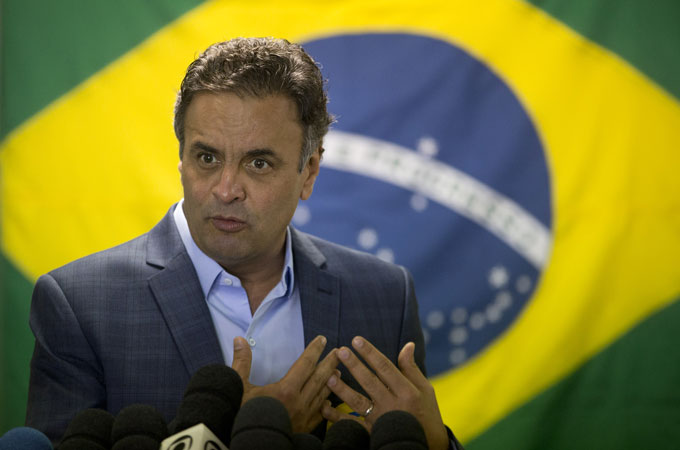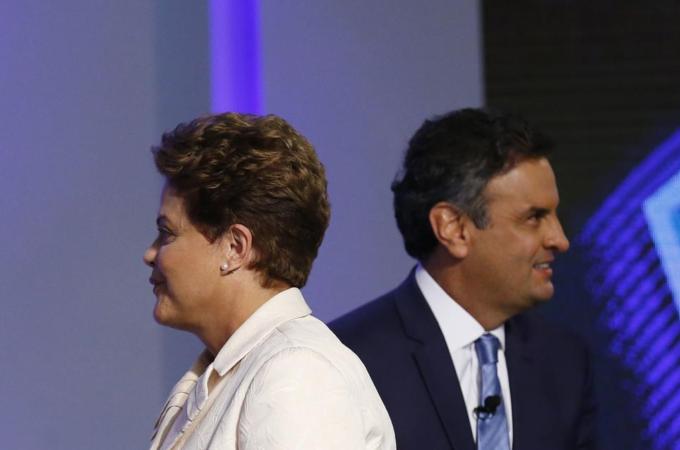Back to the polls for Brazil’s president
Sunday’s vote is expected to be one of the most hotly contested presidential elections in the country’s history.

Rio de Janeiro, Brazil – Ricardo Bastos recently celebrated his 31st birthday with his twin brother Fernando. The party was held in the spacious new apartment he moved into with his girlfriend. The living room was still bare and the large bay windows without curtains. A lone paper dot stuck to one of the transparent panes, it was a campaign sticker for President Dilma Rousseff.
“We are not going to talk politics tonight,“ Fernando announced as he covered the circle with his palm. “Today we declare a truce.“
Keep reading
list of 4 itemsBolsonaro, ‘gender ideology’ and hegemonic masculinity in Brazil
A president in prison won’t solve the crisis in Brazil
Netflix series on Brazil’s corruption exposes political divisions
Despite sharing a womb and childhood home, the two brothers are ideologically at odds over Brazil‘s upcoming presidential election. Ricardo is supporting Rousseff‘s Workers Party (PT), Fernando opposition candidate Aecio Neves.
Sunday‘s vote is expected to be one of the most contested in the country‘s history. According to a recent Datafolha poll, Rousseff has a three-point lead over the Social Democratic Party (PSDB) challenger. Given the two percent margin of error, the candidates are in a technical tie.
“I have worked for Datafolha for over 25 years and can honestly say we have never seen such a disputed race,” Datafolha director general Mauro Paulino told Al Jazeera.
Rousseff, 66, a former Marxist guerrilla who was imprisoned during Brazil‘s 1970 military dictatorship, was elected four-years ago and became the country‘s first female president. She served as chief of staff and energy minister under her political mentor, former president Luiz Inacio Lula da Silva.
Neves, 54, is an economist and former two-term governor of the state of Minas Gerais. He is the grandson of the late Tancredo Neves, who was elected to the presidency in 1985, but passed away before assuming office.
The pro-business candidate defends limiting the state‘s role in the economy, increasing investment, and reinstating some of the policies of former president Fernando Henrique Cardoso, the last PSDB president who governed Brazil from 1994 to 2002.
‘Split down the middle’
This weekend‘s runoff comes after a first round of voting on October 5, when neither candidate reached the 50.1-percent majority required to win the election. Rousseff obtained 42 percent, while Neves came in second with 34 percent.
“The country is almost split down the middle,“ Paulino said. “Poor and low income voters from the north and northeast are supporting Dilma, while wealthier voters in the south are siding with Aecio.“
Three states that could play a decisive role in the election are Sao Paulo, Minas Gerais, and Rio de Janeiro, where most of the country‘s voting population resides.
One in every five voters lives in Sao Paulo, which is considered a stronghold for the PSDB. During the first round, Rousseff lost to Neves by nearly 20 points.
In Minas Gerais, where both candidates were born, Rousseff won by three points. Despite the narrow margin, the results were a surprise blow to Neves who left the governor‘s office in 2010 with a 92-percent approval rating.
In Rio de Janeiro, where twins Fernando and Ricardo Bastos were born and raised, the race is still wide open. Even though Rousseff won with 36 percent of the vote in the first round, former candidate Marina Silva came in close second with 31 percent. Neves was third with 27 percent.
“Marina Silva‘s voters will play an important role in the runoff, especially in Rio de Janeiro, where many of her backers are still undecided,“ Eduardo Raposo, a political scientist from Rio de Janeiro‘s Catholic University, told Al Jazeera.
Election equaliser
 |
| Brazilian presidential candidate Aecio Neves [AP] |
The Amazonian politician entered the race after her running mate, Eduardo Campos, died in a plane crash. She was initially ahead of both Rousseff and Neves in the first round of this election, but quickly dropped in the polls in a surprise turnaround and came in third with 21 percent of the vote.
Silva has now joined Neves‘ campaign, and has publicly endorsed him in ads and events.
For Fernando Bastos, an economist who initially considered voting for Silva, she has become one of the great “equalisers“ of the election.
“At the very least, she put a question mark into the mind of many voters who tend to go for the left,“ Fernando said.
Last year, millions of people took to the streets to protest against transportation fare hikes and government overspending. This led to a 30-percent drop in Rousseff‘s approval ratings in June 2013. Although she managed to bounce back, she never reached the soaring numbers she once enjoyed during her first years in power.
Now an ongoing corruption scandal involving oil giant Petrobras, which has implicated members of her government receiving political bribes, has hurt her “clean hands“ campaign.
It has also given her challengers ammunition for attacks, delivered in sharp jabs during televised debates and flashy ads that describe her as a “liar“ and “cheat“.
“This has been a very aggressive campaign,“ Raposo said. “The insults wouldn‘t have gotten so personal if the race wasn‘t so close.“
The mud has also been slung from the incumbent‘s side. During recent appearances, Rousseff has accused her challenger of nepotism, elitism, and even skirting a breathalyser test.
If there is one thing the Bastos twins agree on, it is that they are unimpressed by what they perceive as cheap antics and distractions in this election campaign.
“They keep focusing on discrediting each other instead of the issues,“ Ricardo said. “It‘s not a good strategy. They won‘t win anyone over if they continue with that.“
 |
| The race between Rousseff and Neves is too close to call [Reuters] |
Economic influence
One of the main issues on voters‘ minds is the economy.
The country is officially in recession. Inflation has skyrocketed to 6.75 percent and the Brazilian real has devalued to its lowest exchange rate since 2005. The Bovespa stock index also plummeted this week, erasing its previous 2014 gains.
Neves supporters say his proposals to reduce taxes and encourage investment will help Brazil‘s economy emerge from its largest dip since the 2008 world financial crisis.
Ricardo is not so confident and fears the tax cuts will only hurt the country’s majority poor.
“The PTs social programmes helped 50 million people out of extreme poverty. Who will Aecio govern for?” Ricardo, a sociology professor, asked. “The one percent who have always had everything in this country?”
The monthly minimum wage has risen from roughly $50 to $300 during the PT’s three-terms in power. Unemployment is also low at 4.9 percent.
“Our country still suffers from deep inequality,” Ricardo said. “At least the current government brought some improvements to that situation with scholarships, jobs, and a raise for our underpaid workers.”
Rousseff has campaigned claiming social programmes would be under threat if Neves is elected. Her challenger has denied this.
No matter what happens, the winner will know half the country disagrees with him or her. The fact that the race is so close is a true sign of a mature democracy.
Question of change
While Fernando does not disagree with his brother on the positive changes the PT brought to Brazil, he said it is time for a change.
“The PT has been in power for 12 years and we have reached a standstill. It is time for someone new to take over.”
Fernando, who described himself as a “pragmatic voter”, supported Rousseff’s former boss, Luiz Inacio Lula da Silva, when he was first elected in 2002.
“It was the first and only time I’ve voted for PT,” Fernando said. “I am not saying I would not vote for them again in the future, but I certainly won’t vote for them now.”
The question of change has been on the minds of many voters, especially those from the emerging middle class.
“These are voters with high school and college diplomas, who rose out of poverty with Dilma and who see potential growth with Aecio,” Raposo said.
Others continue to be undecided. Although voting is mandatory in Brazil, people can choose to cast a blank or null ballot. Others simply abstain from the polls and pay a fine. During the first round, 26 percent of eligible voters did not pick a candidate.
In a race where the country is so polarised, seducing these undecided voters could be key for either candidate. Although Fernando and Ricardo are clear on whom they will be voting for, they can’t predict what awaits their country’s future.
“No matter what happens, the winner will know half the country disagrees with him or her,“ Fernando said. “The fact that the race is so close is a true sign of a mature democracy.“